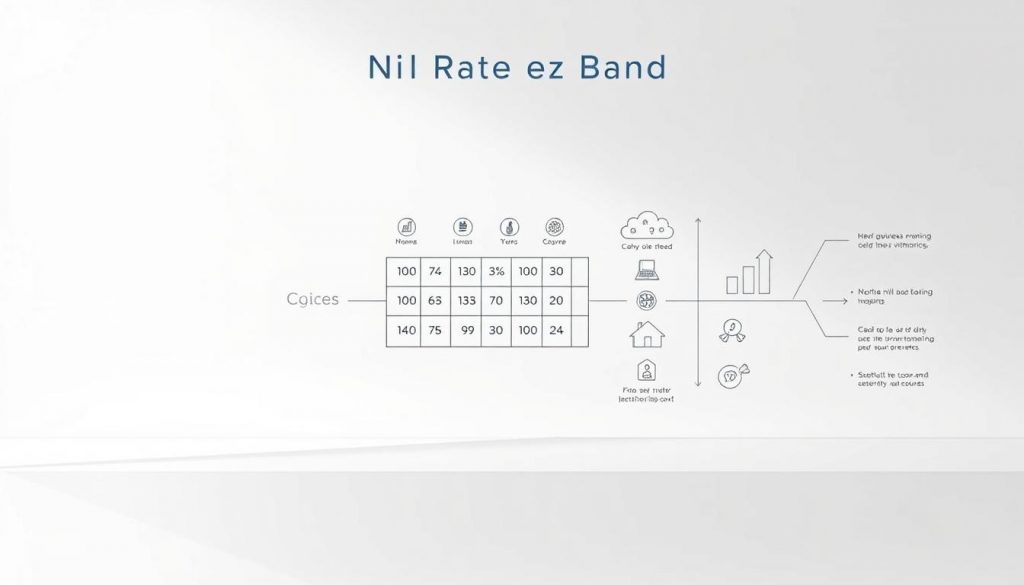Understanding the intricacies of Inheritance Tax (IHT) can be daunting, especially when it comes to the Residence Nil Rate Band (RNRB) and its tapering effects on high-value estates.
Introduced in 2017, the RNRB is a valuable allowance that can reduce IHT liability on a person’s estate when they pass away. The RNRB has been frozen at £175,000 until 2028/29, as per HM Revenue & Customs.
For homeowners in the UK, particularly those with estates valued above £2 million, the RNRB is an important consideration. It can significantly impact the amount of Inheritance Tax payable. If you’re concerned about protecting your estate, we can help. Call us on 0117 440 1555 or book a free consultation here.
Key Takeaways
- Understand how the RNRB affects your estate’s IHT liability.
- Know the current RNRB threshold and its implications.
- Learn how to protect your estate from excessive IHT.
- Discover the importance of estate planning in the UK.
- Find out how to get professional guidance on RNRB and IHT.
Understanding the Residence Nil Rate Band
The Residence Nil Rate Band (RNRB) is a crucial aspect of the UK’s inheritance tax system, designed to reduce the tax burden on families. It is an additional allowance available when a person leaves their residence to their direct descendants, such as children or grandchildren.

Definition of the Residence Nil Rate Band
The RNRB is an allowance that can be claimed against the value of a person’s residence when it is passed on to their direct descendants. Introduced in 2017, it was initially set at £100,000 and has since increased in stages to £175,000 by 2020/21. The RNRB is in addition to the Basic Inheritance Tax Nil Rate Band, which is currently £325,000.
To qualify for the RNRB, the deceased must have left their home, or a share of it, to their direct descendants. The estate may also qualify if the person downsized to a lower value property or sold or gave away their home on or after 8 July 2015.
Key Eligibility Criteria
To be eligible for the RNRB, several conditions must be met:
- The deceased must have owned a residence that was included in their estate at the time of their death.
- The residence, or a share of it, must be left to their direct descendants.
- The deceased must not have been survived by a spouse or civil partner who inherits their estate outright.
If you’re concerned about the impact of inheritance tax on your estate, it’s essential to understand how the RNRB applies to your situation. If you need help setting up a trust to protect your estate from inheritance tax, you can call us on 0117 440 1555 or book a free consultation here.
The Concept of Tapering Explained
Understanding tapering is essential for effective estate planning, particularly for those with estates valued above the £2 million threshold. Tapering refers to the gradual reduction of the Residence Nil Rate Band (RNRB) as the net value of an estate increases.
How Tapering Works
The RNRB is tapered away by £1 for every £2 that the net value of the estate exceeds £2 million. This means that for estates valued above £2.35 million, the RNRB will be reduced to zero. For instance, if an estate is worth £2.2 million, the RNRB will be reduced by £100,000 (£2.2 million – £2 million = £200,000; £200,000 / 2 = £100,000). Consequently, the available RNRB will be £175,000 – £100,000 = £75,000, assuming the standard RNRB is £175,000.
Example of Tapering: Let’s consider an estate valued at £2.5 million. The excess over £2 million is £500,000, resulting in a taper of £250,000 (£500,000 / 2). If the standard RNRB is £175,000, the reduced RNRB would be £175,000 – £250,000 = £0. Thus, the RNRB would be completely tapered away.

The Impact on High-Value Estates
Tapering has significant implications for high-value estates, particularly those with substantial property wealth inheritance. As the value of an estate increases beyond the £2 million threshold, the available RNRB decreases, potentially leading to higher inheritance tax liabilities. It is crucial for individuals with significant assets to understand how tapering works and to plan accordingly to mitigate potential tax burdens.
If you’re concerned about the impact of tapering on your estate, it’s advisable to seek professional guidance. We can help you explore strategies to protect your estate and minimize inheritance tax. For instance, setting up a trust can be an effective way to manage your assets and reduce tax liabilities. If you need assistance, please call us on 0117 440 1555 or book a free consultation here.
HMRC tax exemptions can significantly impact your estate’s tax liability. Understanding how tapering affects your RNRB and exploring available exemptions can help you make informed decisions about your estate planning.
Calculating Your Residence Nil Rate Band
Calculating your Residence Nil Rate Band involves several key factors that can significantly impact your estate’s tax liability. When it comes to estate planning in the UK, understanding how to accurately calculate this band is crucial for maximizing inheritance tax relief rules that apply to your estate.
Factors That Affect the Calculation
Several factors can influence the calculation of your Residence Nil Rate Band. These include:
- The value of the property or properties in your estate.
- Any debts secured against these properties, such as mortgages.
- The extent of ownership: whether you own the property outright or just a share.
- Gifts or other transfers made during your lifetime that could affect the nil rate band.
According to GOV.UK, “The value of the home is calculated based on its open market value less any debts, such as a mortgage.” If the deceased owned a share of the home, only their share is considered in the calculation.
Understanding Property Values
Understanding how property values are assessed is vital. The value is typically determined by the property’s open market value at the time of your passing, minus any outstanding debts like mortgages. For instance, if you own a home worth £500,000 with an outstanding mortgage of £100,000, the value considered for the Residence Nil Rate Band would be £400,000.
| Property Value | Outstanding Mortgage | Value for RNRB |
|---|---|---|
| £500,000 | £100,000 | £400,000 |
| £700,000 | £200,000 | £500,000 |
| £300,000 | £50,000 | £250,000 |
If you’re concerned about how the Residence Nil Rate Band tapering might affect your estate and you’re looking for professional guidance on setting up a trust or other estate planning strategies, we can help. You can reach us at 0117 440 1555 or book a free consultation here.

Implications of Tapering for Inheritance Tax
Understanding how tapering influences your inheritance tax liability is crucial for effective estate planning. As we explore the implications of tapering, it becomes clear that homeowners with high-value estates need to be particularly vigilant.
How Tapering Influences Tax Thresholds
Tapering of the Residence Nil Rate Band (RNRB) can significantly reduce the amount of inheritance tax relief available. For every £2 over the threshold (£1m for individuals, £250,000 for married couples), the RNRB is reduced by £1. This means that estates valued above these thresholds will see their RNRB decrease, potentially leading to a higher inheritance tax liability.
Example: If an individual’s estate is worth £1.2m, the RNRB will be reduced. For every £2 over £1m, £1 of RNRB is lost. So, £200,000 over the threshold results in a £100,000 reduction in RNRB.

Planning Strategies to Mitigate Impact
To minimize the impact of tapering on inheritance tax, several planning strategies can be employed. These include gifting assets during one’s lifetime, downsizing to a less valuable property, and utilizing trusts.
- Gifting: Making gifts during your lifetime can reduce the value of your estate, potentially bringing it below the threshold where RNRB tapering applies.
- Downsizing: If you move to a less valuable property, you may reduce the value of your estate, thus minimizing the impact of tapering.
- Trusts: Establishing a trust can be an effective way to protect your assets while ensuring they are distributed according to your wishes.
| Strategy | Description | Potential Benefit |
|---|---|---|
| Gifting | Making gifts during your lifetime | Reduces estate value, potentially avoiding RNRB tapering |
| Downsizing | Moving to a less valuable property | Minimizes the impact of tapering by reducing estate value |
| Trusts | Establishing a trust to protect assets | Ensures assets are distributed according to your wishes, potentially reducing inheritance tax |
If you’re concerned about the impact of RNRB tapering on your estate, it’s essential to seek professional advice. At MP Estate Planning, we can help you navigate these complex rules and develop a strategy to minimize your inheritance tax liability. Call us on 0117 440 1555 or book a free consultation to discuss your options.
Establishing a Trust to Protect Your Estate
As part of a comprehensive estate planning strategy, trusts can offer flexibility and protection. By establishing a trust, you can ensure that your assets are distributed according to your wishes, while also potentially reducing your inheritance tax liability.

Benefits of Trusts in Estate Planning
Trusts provide several benefits when it comes to estate planning in the UK. These include:
- Flexibility: Trusts allow you to distribute your assets in a way that is tailored to your family’s needs.
- Tax Efficiency: By placing assets in a trust, you may be able to reduce your inheritance tax liability.
- Protection: Trusts can protect your assets from being misused or squandered.
Types of Trusts to Consider
There are several types of trusts that can be used in estate planning, each with its own advantages. Some of the most common include:
| Type of Trust | Description | Benefits |
|---|---|---|
| Discretionary Trust | Gives trustees the power to decide how to distribute assets. | Flexible, allows for changes in circumstances. |
| Interest in Possession Trust | Provides a beneficiary with an income or a right to occupy a property. | Can provide a steady income for beneficiaries. |
| Bare Trust | Assets are held on behalf of a beneficiary who has an absolute right to the assets. | Simple and straightforward, with clear ownership. |
If you need help setting up a trust to protect your estate from inheritance tax, we can assist you. Please call us on 0117 440 1555 or book a free consultation here.
Common Misconceptions About Tapering
Tapering of the Residence Nil Rate Band is often shrouded in misconception, which can have significant implications for high-value estates. Many individuals are unaware of how tapering affects their estate’s tax liability.
Debunking Myths
One common myth is that the Residence Nil Rate Band tapering applies uniformly to all estates. However, the reality is more nuanced. The tapering effect is directly related to the value of the estate and the specific circumstances of the deceased.
- The tapering effect starts when the estate’s value exceeds £2 million.
- For every £2 that the estate’s value exceeds £2 million, the Residence Nil Rate Band is reduced by £1.
- The maximum Residence Nil Rate Band available is £175,000 for individuals.
Understanding these rules can help in planning and potentially mitigating the impact of tapering on your estate.
Clarifying Legal Obligations
It’s essential to understand your legal obligations regarding the Residence Nil Rate Band and tapering. HMRC requires accurate reporting of the estate’s value and the application of the Residence Nil Rate Band.
| Estate Value | Residence Nil Rate Band | Tapering Effect |
|---|---|---|
| Up to £2 million | £175,000 | No tapering |
| £2 million – £2.175 million | £175,000 reducing | Tapering starts |
| Above £2.35 million | £0 | Full tapering |
If you’re concerned about how tapering might affect your estate, seeking professional advice can help you navigate these complex rules and ensure you’re taking the right steps to protect your assets.

For personalized guidance on managing the impact of Residence Nil Rate Band tapering on your estate, consider consulting with estate planning experts. You can reach us at 0117 440 1555 or book a free consultation to discuss your specific situation.
Strategies for High-Value Homeowners
The impact of RNRB tapering on high-value estates necessitates a strategic approach to estate planning. High-value homeowners must consider effective estate planning approaches to mitigate the effects of tapering on their property wealth inheritance.
Effective Estate Planning Approaches
High-value homeowners can benefit from various estate planning strategies, including gifting, downsizing, or utilizing trusts. These approaches can help reduce the impact of RNRB tapering on the estate.
- Gifting: Transferring assets to beneficiaries during one’s lifetime can reduce the estate’s value, potentially lowering inheritance tax liabilities.
- Downsizing: Selling a larger property and moving to a smaller one can reduce the estate’s value, making it eligible for a lower inheritance tax threshold.
- Utilizing Trusts: Establishing a trust can help protect assets from inheritance tax. For more information on setting up a trust, you can visit Jack Ross’s guide on inheritance tax and.
According to STEP, “effective estate planning is crucial for high-value homeowners to manage their property wealth inheritance efficiently.”
“Estate planning is not just about tax planning; it’s about ensuring that your wishes are respected and your loved ones are protected.”
Seeking Professional Guidance
Seeking professional guidance is essential to ensure that these strategies are implemented correctly. Experienced advisors can help high-value homeowners navigate the complexities of estate planning and optimize their RNRB threshold.
| Estate Planning Strategy | Benefits | Considerations |
|---|---|---|
| Gifting | Reduces estate value, potentially lowering inheritance tax | Must be done carefully to avoid adverse tax implications |
| Downsizing | Can reduce estate value and lower inheritance tax threshold | Requires careful planning to ensure it aligns with overall estate planning goals |
| Utilizing Trusts | Protects assets from inheritance tax, provides control over asset distribution | Requires professional setup to ensure compliance with legal requirements |
If you need help setting up a trust or require guidance on estate planning, you can call us on 0117 440 1555 or book a free consultation here.
The Role of Professional Advisors
When it comes to navigating the complexities of estate planning in the UK, professional advisors are indispensable. Their expertise can help you make informed decisions, ensuring that your estate is planned effectively to minimize Inheritance Tax liabilities.
Importance of Estate Planning Experts
Estate planning experts, such as solicitors and accountants, bring a wealth of knowledge to the table. They can provide guidance on various aspects of estate planning, including the implications of probate tax and how to utilize the transferable nil rate band effectively.
- Expertise in navigating complex tax laws
- Personalized advice tailored to your estate’s specific needs
- Assistance in implementing strategies to minimize Inheritance Tax
According to STEP, professional advisors play a crucial role in estate planning, helping individuals plan their estates effectively. By working with experienced advisors, you can ensure that your estate is handled according to your wishes, with minimal tax liability.
“Professional advisors are essential in helping individuals navigate the complexities of estate planning, ensuring that their estates are planned effectively to minimize tax liabilities.”
How They Can Assist in Implementing Strategies
Professional advisors can assist in various ways, from setting up trusts to navigating the intricacies of Inheritance Tax. For instance, they can help you understand how much Inheritance Tax you might pay on a £1 million estate by visiting our page on Inheritance Tax on £1 million.
If you need help setting up a trust or require guidance on estate planning, we are here to assist you. You can call us on 0117 440 1555 or book a free consultation here.
Case Studies: Tapering in Action
Examining case studies on RNRB tapering provides valuable insights into estate planning strategies and their outcomes. By analyzing real-life examples, we can understand how tapering affects Inheritance Tax liability and identify effective approaches to mitigate its impact.
Estate Planning Outcomes
Let’s consider a few scenarios where RNRB tapering played a crucial role in determining the Inheritance Tax liability of an estate.
- A homeowner with an estate valued at £1.2 million, including a main residence worth £500,000, faced a significant Inheritance Tax liability due to RNRB tapering.
- Another case involved a couple who, through careful estate planning, managed to minimize the impact of tapering on their estate’s Inheritance Tax liability.
These examples demonstrate the importance of understanding Residence Nil Rate Band tapering and its implications for Inheritance Tax relief rules.
Lessons Learned from Different Scenarios
Analyzing these case studies reveals several key lessons for effective estate planning:
- Understanding the RNRB threshold and how it applies to your estate is crucial.
- Careful planning can help mitigate the impact of tapering on your estate’s Inheritance Tax liability.
- Seeking professional guidance is essential to navigate the complexities of Inheritance Tax relief rules.
If you’re concerned about the impact of RNRB tapering on your estate, we recommend seeking expert advice. You can contact us on 0117 440 1555 or book a free consultation to discuss your estate planning needs.
Resources for Estate Planning
Estate planning in the UK involves navigating complex rules and regulations, but with the right resources, you can ensure your estate is managed effectively. At our firm, we understand the importance of having access to reliable tools and professional guidance to protect your assets and secure your family’s future.
Useful Tools and Guides
Several resources are available to support individuals in planning their estates. These include online calculators to determine potential inheritance tax limits and guides on how to navigate the probate process. Utilizing these tools can help you make informed decisions about your estate.
- Estate planning calculators to estimate potential inheritance tax
- Guides on the probate process and tax implications
- Information on the transferable nil rate band and how it applies to your estate
By leveraging these resources, you can better understand the intricacies of estate planning and ensure that your estate is managed in accordance with your wishes.
Where to Find Professional Help
While tools and guides are invaluable, professional advice is indispensable when it comes to estate planning. You can find professional help through reputable organizations such as the Society of Trust and Estate Practitioners (STEP). Additionally, consulting with experienced estate planning advisors can provide personalized guidance tailored to your specific circumstances.
| Resource | Description | Benefit |
|---|---|---|
| STEP Professionals | Experienced advisors specializing in trust and estate planning | Personalized guidance and expertise |
| Estate Planning Guides | Comprehensive guides on estate planning and probate | Clear understanding of the process |
| Online Calculators | Tools to estimate inheritance tax and other estate planning metrics | Informed decision-making |
If you need help setting up a trust to protect your estate from inheritance tax, we are here to assist you. You can call us on 0117 440 1555 or book a free consultation to discuss your estate planning needs.
Contact Us for Expert Assistance
Navigating the complexities of residence nil rate band tapering and inheritance tax relief rules can be challenging. At MP Estate Planning, we specialize in providing clear, accessible estate planning guidance tailored to your needs in the UK.
If you’re concerned about the impact of tapering on your high-value estate, our experienced advisors are here to help. We offer personalized support to ensure you’re taking advantage of available tax reliefs, including those related to estate planning UK regulations.
Take the First Step
To discuss your estate planning needs and explore strategies for mitigating inheritance tax, contact us today. You can reach us on 0117 440 1555 or book a free consultation here.
By seeking expert assistance, you can ensure that your family’s future is protected and your estate is managed according to your wishes. Visit our website to learn more about our services and how we can support you in navigating the complexities of inheritance tax allowance and estate planning.


